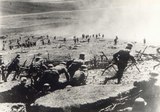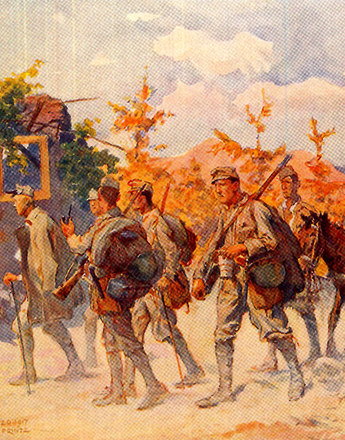-

“Against foreign deceit and greed!” Propaganda postcard (colour print based on an original by Ezel)
Copyright: Wien Museum
-

Attack on the south west war Front, photograph
Copyright: Heeresgeschichtliches Museum, Wien
Partner: Museum of Military History -

Attack on the Isonzo, photograph
Copyright: Heeresgeschichtliches Museum, Wien
Partner: Museum of Military History -

Entrance to the shelter at the peak of the Ortler at around 3850 m above sea-level, photo
Copyright: dform
-

Overview map of the Italian theatre of war, contemporary map
Copyright: Privat
-

Special map of the battles on the Isonzo, contemporary map
Copyright: Privat
Italy’s entry into the war on 23 May 1915 opened up a new theatre of war in the south of the Monarchy that was to be of decisive importance for the Austro-Hungarian army.
The pre-history of Italy’s entry into the war is a prime example of the complicated entanglements of nationalistic politics and great power diplomacy. In 1882 Italy had made the Dual Alliance of 1879 into a Triple Alliance by allying itself with the Central Powers of Germany and Austria-Hungary. At the outbreak of war in 1914, however, Italy initially declared its neutrality on the grounds that the treaty did not oblige it to give military assistance.
While Rome was prepared to accept Austria-Hungary’s plans to expand in the Balkans at Serbia’s expense, it wished this benevolence to be returned in kind and revived an irredentist demand from its younger days as a nation-state, namely, the secession of the Monarchy’s Italian-speaking areas. This primarily meant the Italian areas of the southern Tyrol (the Trentino) and certain border areas in Friuli (Gradisca).
The Italian demands were supported in Berlin but vehemently rejected by Franz Joseph and the proponents of Austro-Hungarian expansionism. The Monarchy was intent on preserving its territorial integrity: after all, they had not started the war in order to lose possessions but with a view to longer-term expansion. As the Emperor categorically put it: ‘I would rather lose everything and go down with honour than be drawn into this disgusting round of robbers’ bargaining.’
Germany exerted increasing pressure on Austria to give in to the Italian demands, hoping that concessions would prevent Italy from entering the war. This danger was also recognized by the Austrian foreign minister Count Berchtold, who resigned on 11 January 1915 over Franz Joseph’s absolute refusal to compromise. In the final analysis, it was the Emperor’s obstinacy that caused Italy to enter the war as an enemy of the Danube Monarchy.
When Italy joined sides with the Triple Entente, it was on the understanding that the Allies would seek to provide Italy with substantial territorial gains at the cost of Austria-Hungary. In the new ordering planned for post-war Europe Italy was promised a frontier as far north as the Brenner Pass. Not only the Italian-speaking Trentino was to come under Italian sovereignty but also the German-speaking areas of southern Tyrol as far as the principal ridge of the Alps. In addition, there were hopes of Italy gaining the Austrian Littoral on the northern Adriatic and even parts of Dalmatia. Although these territories had largely non-Italian populations, they had long been part of the maximum demands made by radical Italian nationalists.
With Italy’s entry into the war Austria’s involvement in the hostilities began to be concentrated on this southern border of the Monarchy. There followed a number of bloody battles in the Austro-Italian border areas in the valley of the Isonzo and in the Dolomites of the Trientino. The Austro-Hungarian army began to have the same experience of static warfare as the German armies were having in the trenches of northern France.
Translation: Peter John Nicholson
Bihl, Wolfdieter: Der Erste Weltkrieg 1914–1918. Chronik – Daten – Fakten, Wien/Köln/Weimar 2010
Hanisch, Ernst: Der lange Schatten des Staates. Österreichische Gesellschaftsgeschichte im 20. Jahrhundert [Österreichische Geschichte 1890–1990, hrsg. von Herwig Wolfram], Wien 2005
Hirschfeld, Gerhard/Krumeich, Gerd/Renz, Irina (Hrsg.): Enzyklopädie Erster Weltkrieg. Aktualisierte und erweiterte Studienausgabe, Paderborn/Wien [u.a.] 2009
Leidinger Hannes/Moritz, Verena: Der Erste Weltkrieg, Wien [u.a.] 2011
Rauchensteiner, Manfried: Der Erste Weltkrieg und das Ende der Habsburgermonarchie 1914–1918, Wien u. a. 2013
Quotation:
‘I would rather lose everything ...', Kaiser Franz Joseph, quoted from: Beller, Steven: Franz Joseph. Eine Biographie, Wien 1997, 186 (Translation)
-
Chapters
- The enthusiasm for the war
- ‘Brothers in arms’: Austria-Hungary and Germany as partners and allies
- Front lines – The course of the war 1914–16
- Italy enters the war
- The impact of the war on civilian society
- The accession of Emperor Karl
- The Sixtus Letters – Karl’s quest for a way out
- Karl’s bid for freedom
- The Russian Revolution and its consequences
- 1917 – The turning point






